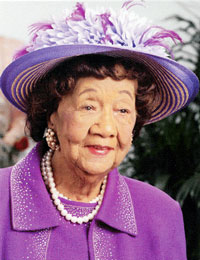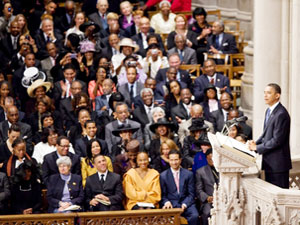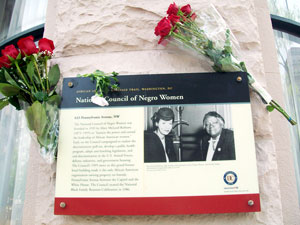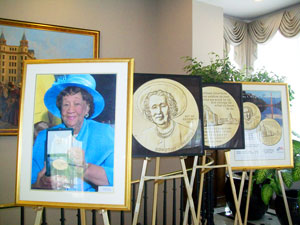Dr. Dorothy Height: Pride in Excellence
By Nisa Islam Muhammad -Staff Writer- | Last updated: May 6, 2010 - 9:56:59 PMWhat's your opinion on this article?
A legend and icon remembered and laid to rest

Dr. Dorothy I. Height
|
It's also the year that a young college bound Dorothy Height is accepted into Barnard College, but by the time she arrives to register she is denied admittance because the great institution of higher learning for women has reached its quota of two Negroes.
“I couldn't bear to call home and report that I wasn't going to college after all—that they didn't want me,” Dr. Height writes in her memoir “Open Wide the Freedom Gates.” She was urged by her brother William to apply to New York University.

President Barack Obama delivers the eulogy at Dr. Dorothy Height's funeral at Washington National Cathedral in Washington, D.C., April 29. Official White House Photo/Chuck Kennedy
|
“Dean Schaeffer studied the letter (Barnard's acceptance). I'll never forget her eyes as she looked up. She said, ‘A girl who makes these kinds of grades doesn't need an application to enroll at NYU.' A ray of hope crept into my heart. She gave me a form. When I filled it out, I was matriculated at NYU. From that day forward I have loved every brick of that university.”
The life of Dr. Dorothy Height was full of rejection, risk and reward. She was what close friend and confidant, former first lady of Washington, D.C., Cora Masters Barry calls, “undaunted.”
“She never let anything turn her around. She had the courage of her convictions,” Mrs. Barry told The Final Call.
Although Miss Height had a four-year scholarship from The Elks, like most college students, she needed extra income. She was living in Harlem during the Depression and jobs were scarce.
Miss Height ironed clothes for Broadway performers like Eddie Cantor and Simple Simon. She wrote obituaries for a Harlem mortician and was a proofreader for Marcus Garvey's weekly newspaper The Negro World.
“Although Garvey failed to realize all of his objectives, his movement still represents a liberation from the psychological bondage of racial inferiority,” Dr. Height writes.
“That was clear at The Negro World, a widely disseminated weekly edited by William Merchant. Pride in excellence was instilled every day. I thrived in that atmosphere.”
The Garvey message of “One God, One Aim, and One Destiny” through the Universal Negro Improvement Association (UNIA) was well received by Blacks at the time but not by Whites. He worked to unite Blacks all around the world but was constantly under FBI scrutiny and investigation.
“In addition to taking a risk, she was able to make extra change even if it was not always a lot of money but in the connections she made with the many people that were there,” Professor T. A. Oduno told The Final Call. He is the Dean of Students at the Amy Jacques Garvey Institute in D.C.
“The women in the UNIA played prominent roles. They had courage. They were winners. Dr. Height learned to stay focused and doing for self. If she ever made a relationship with you she kept it. It was called integrity. She saw that in Marcus Garvey.”
Those early lessons carried Dr. Height throughout her lifetime. She stood with the men the world called controversial in their day—from Marcus Garvey to Dr. King, who many Blacks didn't support at that time, to the Honorable Minister Louis Farrakhan.
“She stood tall in her support and participation in the Million Man March,” said Mrs. Barry. “We met at my home with her, Dr. Barbara Skinner and Sister Claudette Muhammad of the Nation of Islam. We talked about women's involvement in the march. We looked at the Minister's mission statement and made some changes. He accepted our changes and we went forward as the women in support of the Million Man March.”
“Dr. Height's support of the Million Man March is the personification of all of her experiences. She has always been involved in controversy, restrictions and rejections. She was advised not to get involved because her organization would loose donations.”
But that was not the way Dr. Height lived her life. She was guided by principles not the whim of people.
“When she stood up at the March she said to those men, ‘I am here because of you.' She was undaunted. That's why nothing anyone said or did could keep her away,” said Mrs. Barry.
Dr. Height writes in her memoir, “When I made my decision public (to support Minister Farrakhan), the phone started ringing. People called from all over to express their concern. One call, from some of my closest friends, came from Martha's Vineyard. ‘We are calling you from a house full of your friends,' they said. ‘We beg you not to have anything to do with the Million Man March. You have never been tainted. Please don't do it.'”

Placard of Dr. Dorothy Height with Mary McLeod Bethune. Photos: Claudette M. Muhammad
|
“ ‘Well then,' I replied, ‘I guess I'll just have to find more African-American support.' I did not feel that my involvement with the march was in any way inconsistent with my beliefs or the positions on issues that I had taken all of my life.”
Freedom ain't free. There's always a price, always a sacrifice. Dr. Height paid both.
Thousands came to the Washington Cathedral on April 29 to pay their last respects to the Civil Rights legend. In a eulogy delivered by Pres. Barack H. Obama, he detailed her long record of service, and the high place of honor and dignity she held.

A historical display of Dr. Dorothy Height's accomplishments.
|
“It's an unambiguous record of righteous work, worthy of remembrance, worthy of recognition. And yet, one of the ironies, is that year after year, decade in, decade out, Dr. Height went about her work quietly, without fanfare, without self-promotion. She never cared about who got the credit. She didn't need to see her picture in the papers. She understood that the movement gathered strength from the bottom up, those unheralded men and women who don't always make it into the history books but who steadily insisted on their dignity, on their manhood and womanhood.”
INSIDE STORIES AND REVIEWS
-
-
About Harriett ... and the Negro Hollywood Road Show
By Rabiah Muhammad, Guest Columnist » Full Story -
Skepticism greets Jay-Z, NFL talk of inspiring change
By Bryan 18X Crawford and Richard B. Muhammad The Final Call Newspaper @TheFinalCall » Full Story -
The painful problem of Black girls and suicide
By Charlene Muhammad -National Correspondent- » Full Story -
Exploitation of Innocence - Report: Perceptions, policies hurting Black girls
By Charlene Muhammad -National Correspondent- » Full Story -
Big Ballin: Big ideas fuel a father’s Big Baller Brand and brash business sense
By Bryan Crawford -Contributing Writer- » Full Story






 Click Here Stay Connected!
Click Here Stay Connected!








